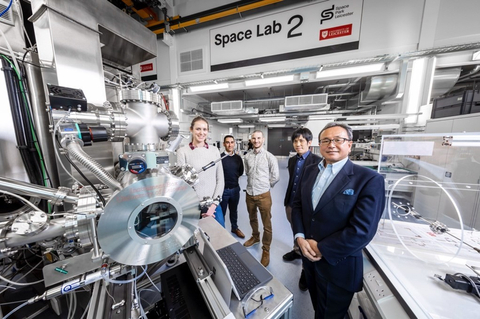ispace, inc. (ispace), a global lunar exploration company, and the University of Leicester, have agreed to collaborate on approaches to lunar night survivability for future ispace lunar lander and rover missions.
This press release features multimedia. View the full release here: https://www.businesswire.com/news/home/20240522837535/en/

(from Left) Dr.Hannah Sargeant, SPL/UoL, Ramy Mesalam, SPL/UoL, Sam Richards, ispace/Meridian Space Command, Yoshiaki Nakaue, ispace, inc., Atsushi Saiki, Chief Revenue Officer ispace, inc. (Photo: Business Wire)
The University and ispace have entered into a strategic consulting agreement to explore lunar night survivability utilizing Radioisotope Heater Units on the Series 3 lunar lander and rovers. The University was awarded funding under Phase I and Phase II of the UK International Bilateral Fund to create mission concepts leveraging the technology on future missions.
The conditions on the lunar surface are extremely harsh with temperatures falling to minus 170 degrees Celsius during the two-week long lunar nights, when sunlight does not warm the surface. To realize long-term missions, new technology and systems are required to survive the cryogenic environment of lunar night.
The Space Nuclear Power group at the University of Leicester has been developing radioisotope power systems for over a decade. These power systems use the heat generated from the decay of radioisotopes, and can be used to provide heat to spacecraft, or converted to electricity to power key subsystems. The technology development has been funded by the European Space Agency (ESA) European Devices Using Radioisotope Energy (ENDURE) program, which has been heavily supported by the UK Space Agency.
Project lead Dr Hannah Sargeant from the University of Leicester School of Physics and Astronomy and Space Park Leicester said: “The radioisotope power technology that has been developed at the University of Leicester, in conjunction with National Nuclear Laboratory, is performing extremely well in our ongoing testing campaigns. In this project, we will be working with ispace to investigate the feasibility of using radioisotope heater units to provide sufficient heat to spacecraft to endure the lunar night.
“The first phase of UKSA International Bilateral Funding was used to work with our international partners to understand their power needs and mission priorities. In Phase 2, we will be conducting both laboratory and concept studies to demonstrate the feasibility of the mission concepts. It will also provide an opportunity to highlight the technology to the civil and commercial space industry and show how it could be used to meet critical power needs for priority missions.”
“Our work with the University of Leicester to transport UK technologies to the Moon and test their effectiveness against the lunar night is another example of the ispace’s unique capability. This collaboration exemplifies the global nature of the cislunar economy, the importance of academic institutions contributing to the vision, and the potential for great achievements,” said Takeshi Hakamada, ispace Founder and CEO. “As lunar exploration continues to gain attention, ispace, through our business entities around the world, is pleased to collaborate with global organizations to advance scientific understanding through transportation to lunar orbit and the lunar surface.”
ispace’s Japan entity is currently in an advanced design and development phase for the Series 3 lander with partial funding through a Japanese government Small Business Innovation & Research grant through the Ministry of Economy, Trade, and Industry. In addition to the lunar Radioisotope Heater Units, ispace is in discussions with a number of entities to transport payloads to lunar orbit and the surface on future missions.
ispace is leveraging its global presence through its three business units in Japan, the U.S., and Luxembourg, for the simultaneous development of Mission 2, currently planned to be launched in 2024, led by its Japanese office, as well as Mission 3, currently planned to be launched in 2026 and led by its U.S. office, and Mission 6, which will utilize the Series 3 lander and is scheduled to be launched by 2027.
About ispace, inc. (https://ispace-inc.com)
ispace, a global lunar exploration company with the vision, “Expand our planet. Expand our future.”, specializes in designing and building lunar landers and rovers. ispace aims to extend the sphere of human life into space and create a sustainable world by providing high-frequency, low-cost transportation services to the Moon. The company has business entities in Japan, Luxembourg, and the United States with approximately 300 employees worldwide. For more information, visit: www.ispace-inc.com and follow us on X: @ispace_inc.
About the University of Leicester (https://le.ac.uk)
The University of Leicester is led by discovery and innovation – an international centre for excellence renowned for research, teaching and broadening access to higher education. It is among the Top 30 universities in the Times Higher Education (THE)’s Research Excellence Framework (REF) 2021 rankings with 89% of research assessed as world-leading or internationally excellent, with wide-ranging impacts on society, health, culture, and the environment. The University is home to more than 20,000 students and approximately 4,000 staff.
About Space Park Leicester (www.space-park.co.uk)
Space Park Leicester is a community at the forefront of the UK space sector, established through a partnership led by the University of Leicester. A world-leading cluster for innovative research, enterprise and education in space and Earth observation, Space Park Leicester represents a collaborative hub for industry and academia to develop and grow.
Opened in Spring 2022 by British European Space Agency astronaut Major Tim Peake, Space Park Leicester provides state-of-the-art facilities for research, development, and manufacturing. It houses capabilities and companies covering an end-to-end life-cycle, from satellite design and engineering, through to downstream data and its applications. This creates unmatched opportunities for collaboration.
Explore Space Park Leicester partnerships, missions, residents, facilities, training programmes and innovation products at: www.space-park.co.uk.
Follow us at @SpaceParkLeic #SpaceParkLeicester
View source version on businesswire.com: https://www.businesswire.com/news/home/20240522837535/en/
Contacts
Andrew C. Ames,
Global Communications Specialist
pr@ispace-inc.com
